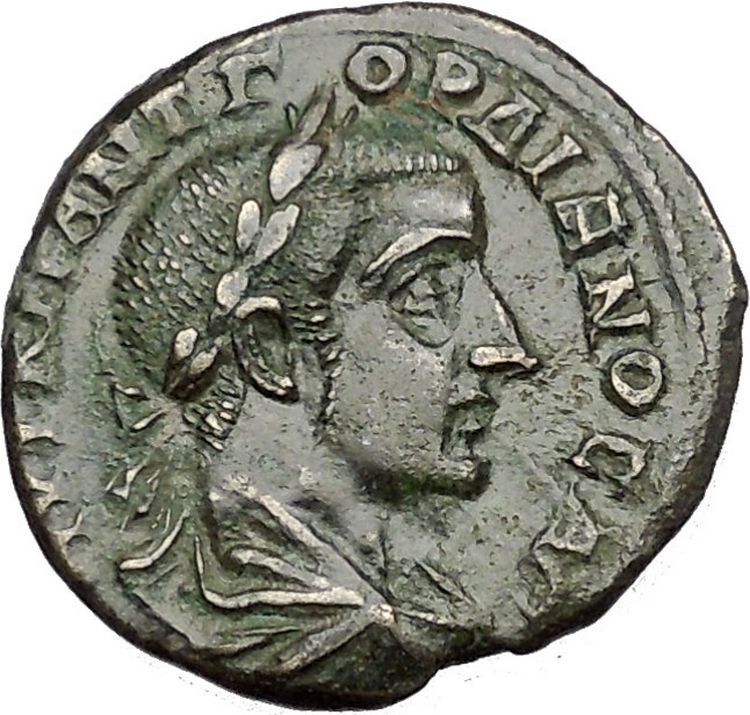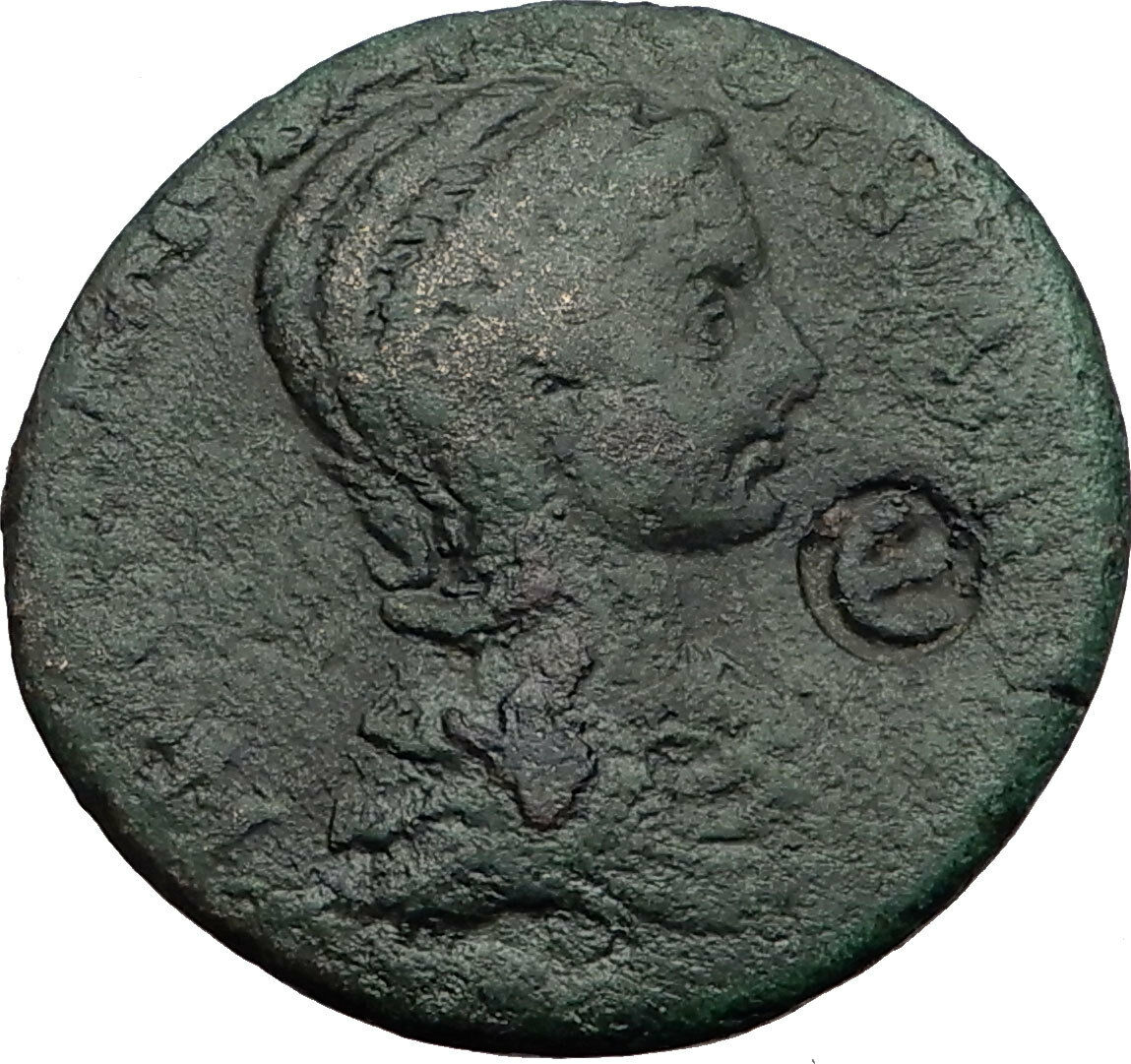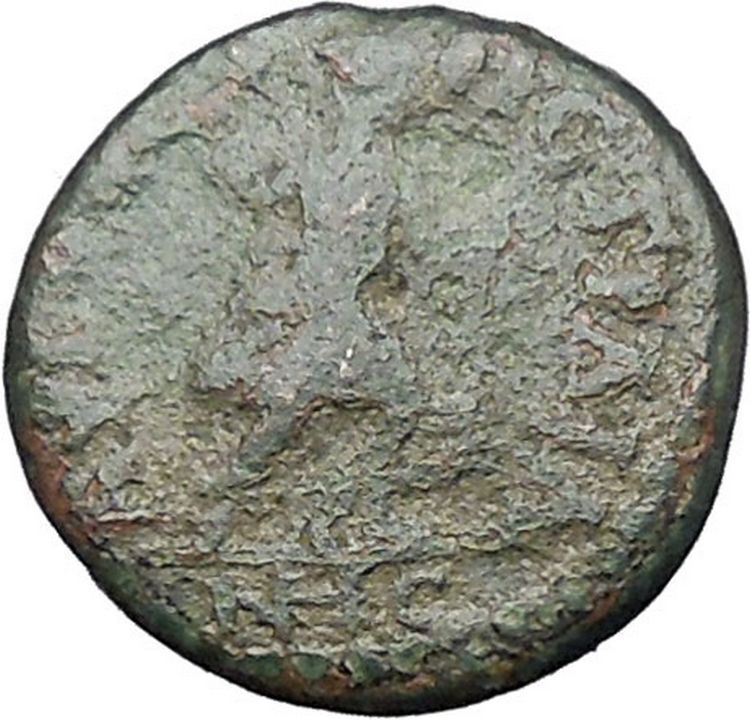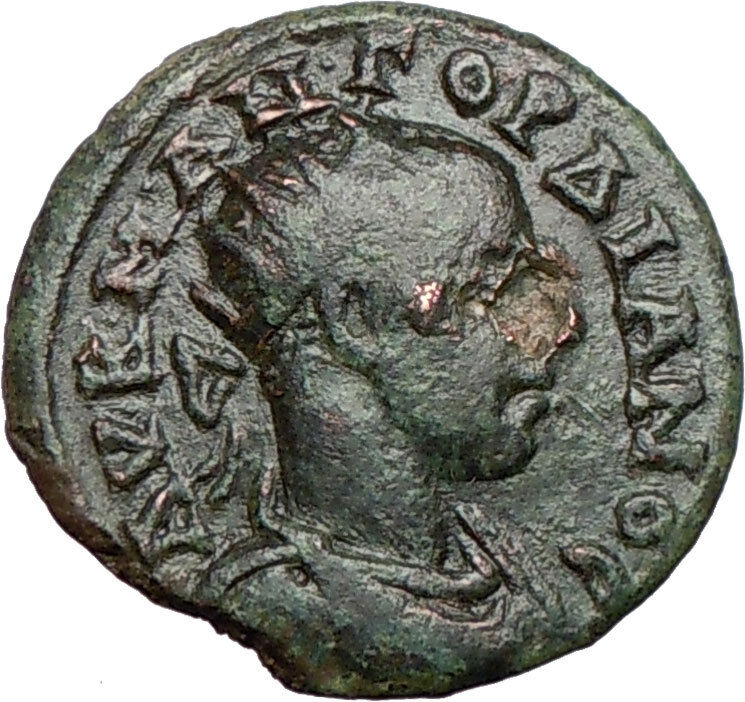|
& Octavian as Triumvirs
Bronze Dupondius 28mm (17.45 grams) of Thessalonica in Macedonia, Struck circa 37 B.C.
Reference: RPC I 1551; SNG Copenhagen 374
ΘΕΣΣΑΛΟΝΙΚΕΩΝ ΕΛΕΥΘΕΠΙΑΣ, diademed head of Agonothesia right.
M ANT AYT Γ KAI AYT, Nike walking left, carrying wreath and palm.
*Numismatic Note: A nice example of a most unusual issue. These coins are struck on a lead alloy bronze flan, hence the low grades, but usually a quite ample flan diameter for the dies.
You are bidding on the exact item pictured, provided with a Certificate of Authenticity and Lifetime Guarantee of Authenticity.
Thessalonica, more anciently Therma, an ancient city in Macedonia, situated at the N.E. Extremity of the Sinus Thermaicus. Under the name of Therma it was not a place of much importance. It was taken and occupied by the Athenians a short time before the commencement of the Peloponnesian war (B.C. 432), but was soon after restored by them to Perdiccas. It was made an important city by Cassander, who collected in this place the inhabitants of several adjacent towns (about B.C. 315), and who gave it the name of Thessalonica, in honor of his wife, the daughter of Philip and sister of Alexander the Great. From this time it became a large and flourishing city. Its harbor was swell situated for commercial intercourse with the Hellespont and the Aegean; and under the Romans it had the additional advantage of lying on the Via Egnatia, which led from the W. shores of Greece to Byzantium and the East. It was visited by Apostle Paula about A.D. 53; and about 2 years afterwards he addressed from Corinth 2 epistles to his converts in the city. Thessalonica continued to be, under the empire, one of the most important cities of Macedonia; and at a later time it became the residence of the prefect, and the capital, of the Illyrian provinces. It is celebrated at this period on account of the fearful massacre of its inhabitants by order of Theodosius, in consequence of a riot in which some of the Roman officers had been assassinated by the populace.
 Marcus Antonius, commonly known in English as Mark Antony (Latin: M·ANTONIVS·M·F·M·N)(January 14, 83 BC – August 1, 30 BC), was a Roman politician and general. As a military commander and administrator, he was an important supporter and loyal friend of his mother’s cousin Julius Caesar. After Caesar’s assassination, Antony formed an official political alliance with Octavian (the future Augustus) and Lepidus, known to historians today as the Second Triumvirate.
Marcus Antonius, commonly known in English as Mark Antony (Latin: M·ANTONIVS·M·F·M·N)(January 14, 83 BC – August 1, 30 BC), was a Roman politician and general. As a military commander and administrator, he was an important supporter and loyal friend of his mother’s cousin Julius Caesar. After Caesar’s assassination, Antony formed an official political alliance with Octavian (the future Augustus) and Lepidus, known to historians today as the Second Triumvirate.
The triumvirate broke up in 33 BC. Disagreement between Octavian and Antony erupted into civil war, the Final War of the Roman Republic, in 31 BC. Antony was defeated by Octavian at the naval Battle of Actium, and in a brief land battle at Alexandria. He and his lover Cleopatra committed suicide shortly thereafter. His career and defeat are significant in Rome’s transformation from Republic to Empire.
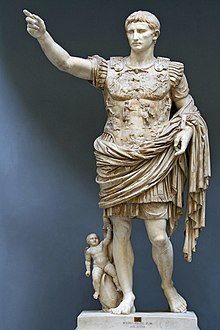
Augustus – Roman Emperor: 27 B.C. – 14 A.D.
| As Octavian: Member of Second Triumvirite, 43-33 B.C. | As Octavian, Imperator, 31-27 B.C. | As Augustus 27 B.C. – 14 A.D. |
| Grand-nephew and adopted son of Julius Caesar | Husband of Scribonia and Livia | Father of Julia (by Scribonia) | Brother of Octavia | Brother-in-law of Mark Antony | Father-in-law of Marcellus, Agrippa and Tiberius | Adoptive father of Tiberius and Nero Claudius Drusus | Uncle of Antonia | Grand-uncle of Germanicus, Claudius and Livilla | Grandfather of Gaius Caesar, Lucius Caesar, Agrippa Postumus, Julia the Younger and Agrippina Senior | Great-grandfather of Nero Caesar, Drusus Caesar, Caligula, Agrippina Junior, Drusilla and Julia Livilla | Great-great-grandfather of Nero |
Augustus (Latin: Imperātor Caesar Dīvī Fīlius Augustus; 23 September 63 BC – 19 August 14 AD) was the founder of the Roman Empire and its first Emperor, ruling from 27 BC until his death in AD 14.
He was born Gaius Octavius into an old and wealthy equestrian branch of the plebeian Octavii family. His maternal great-uncle Julius Caesar was assassinated in 44 BC, and Octavius was named in Caesar’s will as his adopted son and heir, then known as Octavianus (Anglicized as Octavian). He, Mark Antony, and Marcus Lepidus formed the Second Triumvirate to defeat the assassins of Caesar. Following their victory at Philippi, the Triumvirate divided the Roman Republic among themselves and ruled as military dictators. The Triumvirate was eventually torn apart under the competing ambitions of its members. Lepidus was driven into exile and stripped of his position, and Antony committed suicide following his defeat at the Battle of Actium by Octavian in 31 BC.
After the demise of the Second Triumvirate, Augustus restored the outward façade of the free Republic, with governmental power vested in the Roman Senate, the executive magistrates, and the legislative assemblies. In reality, however, he retained his autocratic power over the Republic as a military dictator. By law, Augustus held a collection of powers granted to him for life by the Senate, including supreme military command, and those of tribune and censor. It took several years for Augustus to develop the framework within which a formally republican state could be led under his sole rule. He rejected monarchical titles, and instead called himself Princeps Civitatis (“First Citizen of the State”). The resulting constitutional framework became known as the Principate, the first phase of the Roman Empire.
The reign of Augustus initiated an era of relative peace known as the Pax Romana (The Roman Peace). The Roman world was largely free from large-scale conflict for more than two centuries, despite continuous wars of imperial expansion on the Empire’s frontiers and one year-long civil war over the imperial succession. Augustus dramatically enlarged the Empire, annexing Egypt, Dalmatia, Pannonia, Noricum, and Raetia; expanding possessions in Africa; expanding into Germania; and completing the conquest of Hispania.
Beyond the frontiers, he secured the Empire with a buffer region of client states and made peace with the Parthian Empire through diplomacy. He reformed the Roman system of taxation, developed networks of roads with an official courier system, established a standing army, established the Praetorian Guard, created official police and fire-fighting services for Rome, and rebuilt much of the city during his reign.
Augustus died in AD 14 at the age of 75. He may have died from natural causes, although there were unconfirmed rumors that his wife Livia poisoned him. He was succeeded as Emperor by his adopted son (also stepson and former son-in-law) Tiberius.
Frequently Asked Questions
Who am I dealing with?
How long until my order is shipped?
How will I know when the order was shipped?
What is a certificate of authenticity and what guarantees do you give that the item is authentic?
Is there a money back guarantee?
Is there a number I can call you with questions about my order?
When should I leave feedback?
How and where do I learn more about collecting ancient coins?
|







